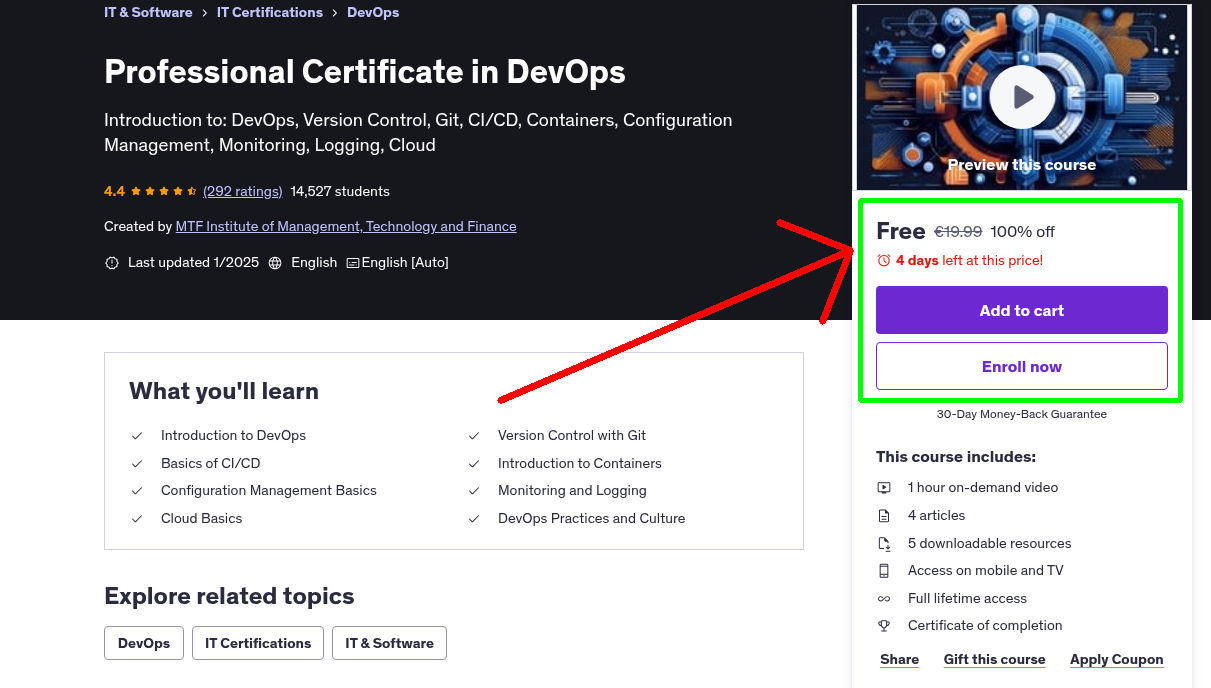
What You'll Learn
- Introduction to DevOps
- Version Control with Git
- Basics of CI/CD
- Introduction to Containers
- Configuration Management Basics
- Monitoring and Logging
- Cloud Basics
- DevOps Practices and Culture
Requirements
- For a better learning experience, we suggest you to use a laptop / mobile phone / pen and paper for taking notes, highlighting important points, and making summaries to reinforce your learning.
Who This Course is For
- No special requirements. A course for anyone who wants to build career in IT and Software Development
- DevOps What it is: DevOps is a set of practices and a cultural philosophy that automates and integrates the processes between software development (Dev) and IT operations (Ops) teams. It emphasizes communication, collaboration, and shared responsibility to shorten the systems development life cycle and provide continuous delivery with high software quality. Key Concepts: Automation: Automating tasks like building, testing, and deployment. Continuous Integration (CI): Frequently integrating code changes into a central repository. Continuous Delivery (CD): Automating the release pipeline to ensure code can be rapidly and reliably deployed to production. Infrastructure as Code (IaC): Managing infrastructure in a declarative manner, often using code, to automate provisioning and management. Monitoring and Feedback: Continuous monitoring of applications and infrastructure to identify and address issues quickly.
- Version Control What it is: Version control systems (like Git) record changes to files over time so that you can recall specific versions later. Benefits: Collaboration: Multiple developers can work on the same codebase without conflicts. History Tracking: See the complete history of changes, who made them, and when. Rollback: Revert to previous versions if needed. Branching and Merging: Experiment with new features without affecting the main codebase.
- CI/CD What it is: CI/CD is a set of practices that enable rapid and reliable software delivery through automation. Key Components: Continuous Integration (CI): Developers integrate code changes frequently, triggering automated builds and tests. Continuous Delivery (CD): Extends CI by automating the release pipeline, ensuring code is always ready for deployment. Continuous Deployment: A step further where every change that passes automated tests is automatically deployed to production.
- Why These Approaches Are Important For Companies: Faster Time to Market: Deliver new features and updates more quickly. Improved Quality: Reduce errors and improve software stability through automation and continuous testing. Increased Efficiency: Automate repetitive tasks, freeing up developers to focus on innovation. Reduced Risk: Smaller, more frequent releases make it easier to identify and fix problems. Better Collaboration: Improve communication and collaboration between development and operations teams. For IT Managers and Developers: Career Advancement: DevOps skills are in high demand, making professionals more valuable. Increased Productivity: Automation and streamlined workflows allow for greater focus on meaningful work. Improved Job Satisfaction: Reduced stress and greater ownership of the development process. Enhanced Collaboration: Work more effectively with colleagues across different teams. Continuous Learning: Stay at the forefront of technology by adopting and mastering new tools and practices.
Your Instructor
MTF Institute of Management, Technology and Finance
Institute of Management, Technology and Finance
4.4 Instructor Rating
101,718 Reviews
970,103 Students
274 Courses
Never Miss a Coupon!
Subscribe to our newsletter to get daily updates on the latest free courses.



